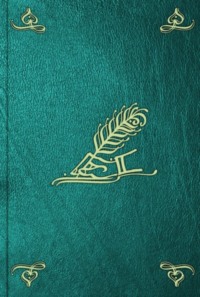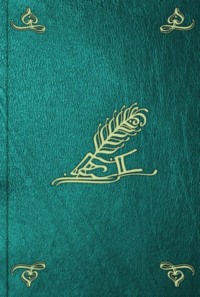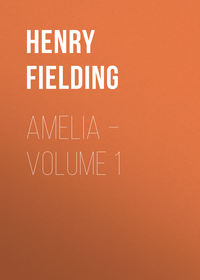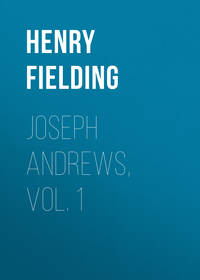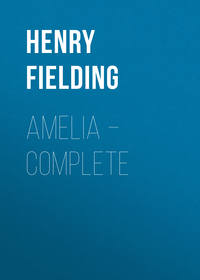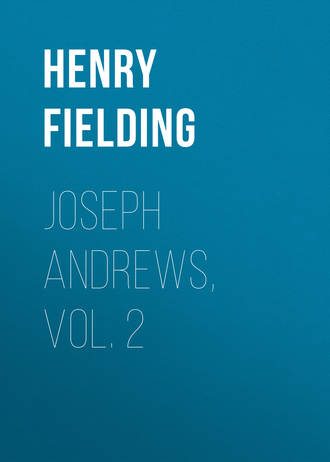 полная версия
полная версияJoseph Andrews, Vol. 2

Henry Fielding
Joseph Andrews, Vol. 2
BOOK II. – continued
CHAPTER XIV.
An interview between parson Adams and parson Trulliber
Parson Adams came to the house of parson Trulliber, whom he found stript into his waistcoat, with an apron on, and a pail in his hand, just come from serving his hogs; for Mr Trulliber was a parson on Sundays, but all the other six might more properly be called a farmer. He occupied a small piece of land of his own, besides which he rented a considerable deal more. His wife milked his cows, managed his dairy, and followed the markets with butter and eggs. The hogs fell chiefly to his care, which he carefully waited on at home, and attended to fairs; on which occasion he was liable to many jokes, his own size being, with much ale, rendered little inferior to that of the beasts he sold. He was indeed one of the largest men you should see, and could have acted the part of Sir John Falstaff without stuffing. Add to this that the rotundity of his belly was considerably increased by the shortness of his stature, his shadow ascending very near as far in height, when he lay on his back, as when he stood on his legs. His voice was loud and hoarse, and his accents extremely broad. To complete the whole, he had a stateliness in his gait, when he walked, not unlike that of a goose, only he stalked slower.
Mr Trulliber, being informed that somebody wanted to speak with him, immediately slipt off his apron and clothed himself in an old night-gown, being the dress in which he always saw his company at home. His wife, who informed him of Mr Adams's arrival, had made a small mistake; for she had told her husband, "She believed there was a man come for some of his hogs." This supposition made Mr Trulliber hasten with the utmost expedition to attend his guest. He no sooner saw Adams than, not in the least doubting the cause of his errand to be what his wife had imagined, he told him, "He was come in very good time; that he expected a dealer that very afternoon;" and added, "they were all pure and fat, and upwards of twenty score a-piece." Adams answered, "He believed he did not know him." "Yes, yes," cried Trulliber, "I have seen you often at fair; why, we have dealt before now, mun, I warrant you. Yes, yes," cries he, "I remember thy face very well, but won't mention a word more till you have seen them, though I have never sold thee a flitch of such bacon as is now in the stye." Upon which he laid violent hands on Adams, and dragged him into the hog-stye, which was indeed but two steps from his parlour window. They were no sooner arrived there than he cry'd out, "Do but handle them! step in, friend! art welcome to handle them, whether dost buy or no." At which words, opening the gate, he pushed Adams into the pig-stye, insisting on it that he should handle them before he would talk one word with him.
Adams, whose natural complacence was beyond any artificial, was obliged to comply before he was suffered to explain himself; and, laying hold on one of their tails, the unruly beast gave such a sudden spring, that he threw poor Adams all along in the mire. Trulliber, instead of assisting him to get up, burst into a laughter, and, entering the stye, said to Adams, with some contempt, "Why, dost not know how to handle a hog?" and was going to lay hold of one himself, but Adams, who thought he had carried his complacence far enough, was no sooner on his legs than he escaped out of the reach of the animals, and cried out, "Nihil habeo cum porcis: I am a clergyman, sir, and am not come to buy hogs." Trulliber answered, "He was sorry for the mistake, but that he must blame his wife," adding, "she was a fool, and always committed blunders." He then desired him to walk in and clean himself, that he would only fasten up the stye and follow him. Adams desired leave to dry his greatcoat, wig, and hat by the fire, which Trulliber granted. Mrs Trulliber would have brought him a basin of water to wash his face, but her husband bid her be quiet like a fool as she was, or she would commit more blunders, and then directed Adams to the pump. While Adams was thus employed, Trulliber, conceiving no great respect for the appearance of his guest, fastened the parlour door, and now conducted him into the kitchen, telling him he believed a cup of drink would do him no harm, and whispered his wife to draw a little of the worst ale. After a short silence Adams said, "I fancy, sir, you already perceive me to be a clergyman." – "Ay, ay," cries Trulliber, grinning, "I perceive you have some cassock; I will not venture to caale it a whole one." Adams answered, "It was indeed none of the best, but he had the misfortune to tear it about ten years ago in passing over a stile." Mrs Trulliber, returning with the drink, told her husband, "She fancied the gentleman was a traveller, and that he would be glad to eat a bit." Trulliber bid her hold her impertinent tongue, and asked her, "If parsons used to travel without horses?" adding, "he supposed the gentleman had none by his having no boots on." – "Yes, sir, yes," says Adams; "I have a horse, but I have left him behind me." – "I am glad to hear you have one," says Trulliber; "for I assure you I don't love to see clergymen on foot; it is not seemly nor suiting the dignity of the cloth." Here Trulliber made a long oration on the dignity of the cloth (or rather gown) not much worth relating, till his wife had spread the table and set a mess of porridge on it for his breakfast. He then said to Adams, "I don't know, friend, how you came to caale on me; however, as you are here, if you think proper to eat a morsel, you may." Adams accepted the invitation, and the two parsons sat down together; Mrs Trulliber waiting behind her husband's chair, as was, it seems, her custom. Trulliber eat heartily, but scarce put anything in his mouth without finding fault with his wife's cookery. All which the poor woman bore patiently. Indeed, she was so absolute an admirer of her husband's greatness and importance, of which she had frequent hints from his own mouth, that she almost carried her adoration to an opinion of his infallibility. To say the truth, the parson had exercised her more ways than one; and the pious woman had so well edified by her husband's sermons, that she had resolved to receive the bad things of this world together with the good. She had indeed been at first a little contentious; but he had long since got the better; partly by her love for this, partly by her fear of that, partly by her religion, partly by the respect he paid himself, and partly by that which he received from the parish. She had, in short, absolutely submitted, and now worshipped her husband, as Sarah did Abraham, calling him (not lord, but) master. Whilst they were at table her husband gave her a fresh example of his greatness; for, as she had just delivered a cup of ale to Adams, he snatched it out of his hand, and, crying out, "I caal'd vurst," swallowed down the ale. Adams denied it; it was referred to the wife, who, though her conscience was on the side of Adams, durst not give it against her husband; upon which he said, "No, sir, no; I should not have been so rude to have taken it from you if you had caal'd vurst, but I'd have you know I'm a better man than to suffer the best he in the kingdom to drink before me in my own house when I caale vurst."
As soon as their breakfast was ended, Adams began in the following manner: "I think, sir, it is high time to inform you of the business of my embassy. I am a traveller, and am passing this way in company with two young people, a lad and a damsel, my parishioners, towards my own cure; we stopt at a house of hospitality in the parish, where they directed me to you as having the cure." – "Though I am but a curate," says Trulliber, "I believe I am as warm as the vicar himself, or perhaps the rector of the next parish too; I believe I could buy them both." – "Sir," cries Adams, "I rejoice thereat. Now, sir, my business is, that we are by various accidents stript of our money, and are not able to pay our reckoning, being seven shillings. I therefore request you to assist me with the loan of those seven shillings, and also seven shillings more, which, peradventure, I shall return to you; but if not, I am convinced you will joyfully embrace such an opportunity of laying up a treasure in a better place than any this world affords."
Suppose a stranger, who entered the chambers of a lawyer, being imagined a client, when the lawyer was preparing his palm for the fee, should pull out a writ against him. Suppose an apothecary, at the door of a chariot containing some great doctor of eminent skill, should, instead of directions to a patient, present him with a potion for himself. Suppose a minister should, instead of a good round sum, treat my lord – , or sir – , or esq. – with a good broomstick. Suppose a civil companion, or a led captain, should, instead of virtue, and honour, and beauty, and parts, and admiration, thunder vice, and infamy, and ugliness, and folly, and contempt, in his patron's ears. Suppose, when a tradesman first carries in his bill, the man of fashion should pay it; or suppose, if he did so, the tradesman should abate what he had overcharged, on the supposition of waiting. In short – suppose what you will, you never can nor will suppose anything equal to the astonishment which seized on Trulliber, as soon as Adams had ended his speech. A while he rolled his eyes in silence; sometimes surveying Adams, then his wife; then casting them on the ground, then lifting them up to heaven. At last he burst forth in the following accents: "Sir, I believe I know where to lay up my little treasure as well as another. I thank G – , if I am not so warm as some, I am content; that is a blessing greater than riches; and he to whom that is given need ask no more. To be content with a little is greater than to possess the world; which a man may possess without being so. Lay up my treasure! what matters where a man's treasure is whose heart is in the Scriptures? there is the treasure of a Christian." At these words the water ran from Adams's eyes; and, catching Trulliber by the hand in a rapture, "Brother," says he, "heavens bless the accident by which I came to see you! I would have walked many a mile to have communed with you; and, believe me, I will shortly pay you a second visit; but my friends, I fancy, by this time, wonder at my stay; so let me have the money immediately." Trulliber then put on a stern look, and cried out, "Thou dost not intend to rob me?" At which the wife, bursting into tears, fell on her knees and roared out, "O dear sir! for Heaven's sake don't rob my master; we are but poor people." "Get up, for a fool as thou art, and go about thy business," said Trulliber; "dost think the man will venture his life? he is a beggar, and no robber." "Very true, indeed," answered Adams. "I wish, with all my heart, the tithing-man was here," cries Trulliber; "I would have thee punished as a vagabond for thy impudence. Fourteen shillings indeed! I won't give thee a farthing. I believe thou art no more a clergyman than the woman there" (pointing to his wife); "but if thou art, dost deserve to have thy gown stript over thy shoulders for running about the country in such a manner." "I forgive your suspicions," says Adams; "but suppose I am not a clergyman, I am nevertheless thy brother; and thou, as a Christian, much more as a clergyman, art obliged to relieve my distress." "Dost preach to me?" replied Trulliber; "dost pretend to instruct me in my duty?" "Ifacks, a good story," cries Mrs Trulliber, "to preach to my master." "Silence, woman," cries Trulliber. "I would have thee know, friend" (addressing himself to Adams), "I shall not learn my duty from such as thee. I know what charity is, better than to give to vagabonds." "Besides, if we were inclined, the poor's rate obliges us to give so much charity," cries the wife. "Pugh! thou art a fool. Poor's reate! Hold thy nonsense," answered Trulliber; and then, turning to Adams, he told him, "he would give him nothing." "I am sorry," answered Adams, "that you do know what charity is, since you practise it no better: I must tell you, if you trust to your knowledge for your justification, you will find yourself deceived, though you should add faith to it, without good works." "Fellow," cries Trulliber, "dost thou speak against faith in my house? Get out of my doors: I will no longer remain under the same roof with a wretch who speaks wantonly of faith and the Scriptures." "Name not the Scriptures," says Adams. "How! not name the Scriptures! Do you disbelieve the Scriptures?" cries Trulliber. "No; but you do," answered Adams, "if I may reason from your practice; for their commands are so explicit, and their rewards and punishments so immense, that it is impossible a man should stedfastly believe without obeying. Now, there is no command more express, no duty more frequently enjoined, than charity. Whoever, therefore, is void of charity, I make no scruple of pronouncing that he is no Christian." "I would not advise thee," says Trulliber, "to say that I am no Christian: I won't take it of you; for I believe I am as good a man as thyself" (and indeed, though he was now rather too corpulent for athletic exercises, he had, in his youth, been one of the best boxers and cudgel-players in the county). His wife, seeing him clench his fist, interposed, and begged him not to fight, but show himself a true Christian, and take the law of him. As nothing could provoke Adams to strike, but an absolute assault on himself or his friend, he smiled at the angry look and gestures of Trulliber; and, telling him he was sorry to see such men in orders, departed without further ceremony.
CHAPTER XV.
An adventure, the consequence of a new instance which parson Adams gave of his forgetfulness
When he came back to the inn he found Joseph and Fanny sitting together. They were so far from thinking his absence long, as he had feared they would, that they never once missed or thought of him. Indeed, I have been often assured by both, that they spent these hours in a most delightful conversation; but, as I never could prevail on either to relate it, so I cannot communicate it to the reader.
Adams acquainted the lovers with the ill success of his enterprize. They were all greatly confounded, none being able to propose any method of departing, till Joseph at last advised calling in the hostess, and desiring her to trust them; which Fanny said she despaired of her doing, as she was one of the sourest-faced women she had ever beheld.
But she was agreeably disappointed; for the hostess was no sooner asked the question than she readily agreed; and, with a curtsy and smile, wished them a good journey. However, lest Fanny's skill in physiognomy should be called in question, we will venture to assign one reason which might probably incline her to this confidence and good-humour. When Adams said he was going to visit his brother, he had unwittingly imposed on Joseph and Fanny, who both believed he had meant his natural brother, and not his brother in divinity, and had so informed the hostess, on her enquiry after him. Now Mr Trulliber had, by his professions of piety, by his gravity, austerity, reserve, and the opinion of his great wealth, so great an authority in his parish, that they all lived in the utmost fear and apprehension of him. It was therefore no wonder that the hostess, who knew it was in his option whether she should ever sell another mug of drink, did not dare to affront his supposed brother by denying him credit.
They were now just on their departure when Adams recollected he had left his greatcoat and hat at Mr Trulliber's. As he was not desirous of renewing his visit, the hostess herself, having no servant at home, offered to fetch it.
This was an unfortunate expedient; for the hostess was soon undeceived in the opinion she had entertained of Adams, whom Trulliber abused in the grossest terms, especially when he heard he had had the assurance to pretend to be his near relation.
At her return, therefore, she entirely changed her note. She said, "Folks might be ashamed of travelling about, and pretending to be what they were not. That taxes were high, and for her part she was obliged to pay for what she had; she could not therefore possibly, nor would she, trust anybody; no, not her own father. That money was never scarcer, and she wanted to make up a sum. That she expected, therefore, they should pay their reckoning before they left the house."
Adams was now greatly perplexed; but, as he knew that he could easily have borrowed such a sum in his own parish, and as he knew he would have lent it himself to any mortal in distress, so he took fresh courage, and sallied out all round the parish, but to no purpose; he returned as pennyless as he went, groaning and lamenting that it was possible, in a country professing Christianity, for a wretch to starve in the midst of his fellow-creatures who abounded.
Whilst he was gone, the hostess, who stayed as a sort of guard with Joseph and Fanny, entertained them with the goodness of parson Trulliber. And, indeed, he had not only a very good character as to other qualities in the neighbourhood, but was reputed a man of great charity; for, though he never gave a farthing, he had always that word in his mouth.
Adams was no sooner returned the second time than the storm grew exceedingly high, the hostess declaring, among other things, that, if they offered to stir without paying her, she would soon overtake them with a warrant.
Plato and Aristotle, or somebody else, hath said, that when the most exquisite cunning fails, chance often hits the mark, and that by means the least expected. Virgil expresses this very boldly: —
Turne, quod optanti divum promittere nemoAuderet, volvenda dies, en! attulit ultro.I would quote more great men if I could; but my memory not permitting me, I will proceed to exemplify these observations by the following instance: —
There chanced (for Adams had not cunning enough to contrive it) to be at that time in the alehouse a fellow who had been formerly a drummer in an Irish regiment, and now travelled the country as a pedlar. This man, having attentively listened to the discourse of the hostess, at last took Adams aside, and asked him what the sum was for which they were detained. As soon as he was informed, he sighed, and said, "He was sorry it was so much; for that he had no more than six shillings and sixpence in his pocket, which he would lend them with all his heart." Adams gave a caper, and cry'd out, "It would do; for that he had sixpence himself." And thus these poor people, who could not engage the compassion of riches and piety, were at length delivered out of their distress by the charity of a poor pedlar.
I shall refer it to my reader to make what observations he pleases on this incident: it is sufficient for me to inform him that, after Adams and his companions had returned him a thousand thanks, and told him where he might call to be repaid, they all sallied out of the house without any compliments from their hostess, or indeed without paying her any; Adams declaring he would take particular care never to call there again; and she on her side assuring them she wanted no such guests.
CHAPTER XVI.
A very curious adventure, in which Mr Adams gave a much greater instance of the honest simplicity of his heart, than of his experience in the ways of this world
Our travellers had walked about two miles from that inn, which they had more reason to have mistaken for a castle than Don Quixote ever had any of those in which he sojourned, seeing they had met with such difficulty in escaping out of its walls, when they came to a parish, and beheld a sign of invitation hanging out. A gentleman sat smoaking a pipe at the door, of whom Adams inquired the road, and received so courteous and obliging an answer, accompanied with so smiling a countenance, that the good parson, whose heart was naturally disposed to love and affection, began to ask several other questions; particularly the name of the parish, and who was the owner of a large house whose front they then had in prospect. The gentleman answered as obligingly as before; and as to the house, acquainted him it was his own. He then proceeded in the following manner: "Sir, I presume by your habit you are a clergyman; and as you are travelling on foot I suppose a glass of good beer will not be disagreeable to you; and I can recommend my landlord's within as some of the best in all this country. What say you, will you halt a little and let us take a pipe together? there is no better tobacco in the kingdom." This proposal was not displeasing to Adams, who had allayed his thirst that day with no better liquor than what Mrs Trulliber's cellar had produced; and which was indeed little superior, either in richness or flavour, to that which distilled from those grains her generous husband bestowed on his hogs. Having, therefore, abundantly thanked the gentleman for his kind invitation, and bid Joseph and Fanny follow him, he entered the alehouse, where a large loaf and cheese and a pitcher of beer, which truly answered the character given of it, being set before them, the three travellers fell to eating, with appetites infinitely more voracious than are to be found at the most exquisite eating-houses in the parish of St. James's.
The gentleman expressed great delight in the hearty and cheerful behaviour of Adams; and particularly in the familiarity with which he conversed with Joseph and Fanny, whom he often called his children; a term he explained to mean no more than his parishioners; saying, "He looked on all those whom God had intrusted to his care to stand to him in that relation." The gentleman, shaking him by the hand, highly applauded those sentiments. "They are, indeed," says he, "the true principles of a Christian divine; and I heartily wish they were universal; but, on the contrary, I am sorry to say the parson of our parish, instead of esteeming his poor parishioners as a part of his family, seems rather to consider them as not of the same species with himself. He seldom speaks to any, unless some few of the richest of us; nay, indeed, he will not move his hat to the others. I often laugh when I behold him on Sundays strutting along the churchyard like a turkey-cock through rows of his parishioners, who bow to him with as much submission, and are as unregarded, as a set of servile courtiers by the proudest prince in Christendom. But if such temporal pride is ridiculous, surely the spiritual is odious and detestable; if such a puffed – up empty human bladder, strutting in princely robes, justly moves one's derision, surely in the habit of a priest it must raise our scorn."
"Doubtless," answered Adams, "your opinion is right; but I hope such examples are rare. The clergy whom I have the honour to know maintain a different behaviour; and you will allow me, sir, that the readiness which too many of the laity show to contemn the order may be one reason of their avoiding too much humility." "Very true, indeed," says the gentleman; "I find, sir, you are a man of excellent sense, and am happy in this opportunity of knowing you; perhaps our accidental meeting may not be disadvantageous to you neither. At present I shall only say to you that the incumbent of this living is old and infirm, and that it is in my gift. Doctor, give me your hand; and assure yourself of it at his decease." Adams told him, "He was never more confounded in his life than at his utter incapacity to make any return to such noble and unmerited generosity." "A mere trifle, sir," cries the gentleman, "scarce worth your acceptance; a little more than three hundred a year. I wish it was double the value for your sake." Adams bowed, and cried from the emotions of his gratitude; when the other asked him, "If he was married, or had any children, besides those in the spiritual sense he had mentioned." "Sir," replied the parson, "I have a wife and six at your service." "That is unlucky," says the gentleman; "for I would otherwise have taken you into my own house as my chaplain; however, I have another in the parish (for the parsonage-house is not good enough), which I will furnish for you. Pray, does your wife understand a dairy?" "I can't profess she does," says Adams. "I am sorry for it," quoth the gentleman; "I would have given you half-a-dozen cows, and very good grounds to have maintained them." "Sir," said Adams, in an ecstasy, "you are too liberal; indeed you are." "Not at all," cries the gentleman: "I esteem riches only as they give me an opportunity of doing good; and I never saw one whom I had a greater inclination to serve." At which words he shook him heartily by the hand, and told him he had sufficient room in his house to entertain him and his friends. Adams begged he might give him no such trouble; that they could be very well accommodated in the house where they were; forgetting they had not a sixpenny piece among them. The gentleman would not be denied; and, informing himself how far they were travelling, he said it was too long a journey to take on foot, and begged that they would favour him by suffering him to lend them a servant and horses; adding, withal, that, if they would do him the pleasure of their company only two days, he would furnish them with his coach and six. Adams, turning to Joseph, said, "How lucky is this gentleman's goodness to you, who I am afraid would be scarce able to hold out on your lame leg!" and then, addressing the person who made him these liberal promises, after much bowing, he cried out, "Blessed be the hour which first introduced me to a man of your charity! you are indeed a Christian of the true primitive kind, and an honour to the country wherein you live. I would willingly have taken a pilgrimage to the Holy Land to have beheld you; for the advantages which we draw from your goodness give me little pleasure, in comparison of what I enjoy for your own sake when I consider the treasures you are by these means laying up for yourself in a country that passeth not away. We will therefore, most generous sir, accept your goodness, as well the entertainment you have so kindly offered us at your house this evening, as the accommodation of your horses to-morrow morning." He then began to search for his hat, as did Joseph for his; and both they and Fanny were in order of departure, when the gentleman, stopping short, and seeming to meditate by himself for the space of about a minute, exclaimed thus: "Sure never anything was so unlucky; I had forgot that my house-keeper was gone abroad, and hath locked up all my rooms; indeed, I would break them open for you, but shall not be able to furnish you with a bed; for she has likewise put away all my linen. I am glad it entered into my head before I had given you the trouble of walking there; besides, I believe you will find better accommodations here than you expected. – Landlord, you can provide good beds for these people, can't you?" "Yes, and please your worship," cries the host, "and such as no lord or justice of the peace in the kingdom need be ashamed to lie in." "I am heartily sorry," says the gentleman, "for this disappointment. I am resolved I will never suffer her to carry away the keys again." "Pray, sir, let it not make you uneasy," cries Adams; "we shall do very well here; and the loan of your horses is a favour we shall be incapable of making any return to." "Ay!" said the squire, "the horses shall attend you here at what hour in the morning you please;" and now, after many civilities too tedious to enumerate, many squeezes by the hand, with most affectionate looks and smiles at each other, and after appointing the horses at seven the next morning, the gentleman took his leave of them, and departed to his own house. Adams and his companions returned to the table, where the parson smoaked another pipe, and then they all retired to rest.


